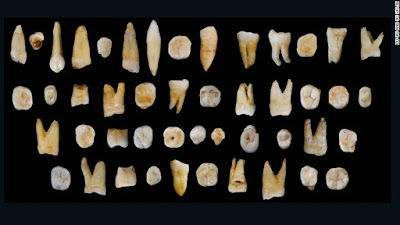The
47 teeth were found in a cave in Daoxian, in China's Hunan province,
and are the strongest proof yet that modern humans first migrated from
Africa to Asia 80,000 to 120,000 years ago, according to a study
published in the journal, Nature.
"This
is stunning, it's major league," Michael Petraglia, an archaeologist
from the University of Oxford in the UK, who was not involved in the
study, told Nature. "It's one of the most important finds coming out of Asia in the last decade."
The
widely accepted theory of modern human migration, known as "Out of
Africa," is based on
available scientific evidence that indicates modern
humans originated in Africa and made their first successful migration
to the rest of the world in a single wave between 50,000 and 70,000
years ago.
These
teeth challenge that theory, both in terms of the timing of the first
migration from Africa and whether a different group of modern humans
evolved separately in Asia.
Maria Martinón-Torres, a researcher at
University College London and one of the co-leads of the study, said the
new finds open up a raft of questions to be answered.
"What
does this mean? What is the origin of this population (of people in
China)? And what is their fate?" she asked. "Some people really now have
to reconsider models. Maybe there's not only one (migration) out of
Africa, (maybe) there are several out of Africa."
"And
also we have to understand what happened in Asia," she added. "These
populations, did they really evolve also for a while outside Africa?"
The
research also raises questions about how and why modern humans reached
Asia earlier than Europe, where the earliest modern human remains found
so far are around 45,000 years old.
Liu said the research group plans to extract DNA from the teeth samples to shed more light on the origins of the Daoxian people.


No comments:
Post a Comment